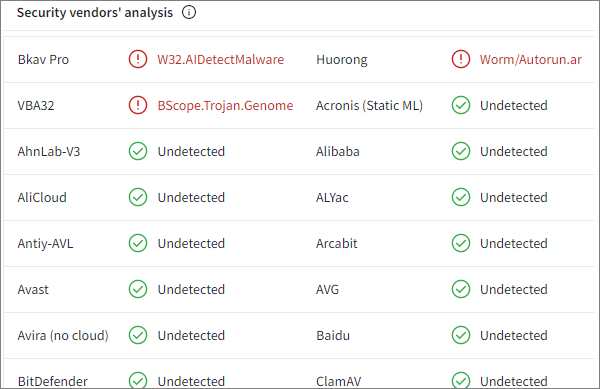Installation Issues
"My antivirus software or online virus checkers block SpeedBase or report it as unsafe"
Some low-reputation antivirus software vendors and related online services are known to occasionally generate false positives
for the SpeedBase installer.
The main reason for this is that they apply unreasonable methods to determine whether a file is dangerous. For example,
they may block or delete an installer simply because it was recently released and hasn't been used by enough of their customers,
or because they have detected a code segment that slightly resembles that of a known virus.
Why does this happen?
In recent years, the Windows operating system, as well as web browsers and search engines, have introduced many effective
solutions against almost all types of malicious software. Even novice and vulnerable computer users are rarely concerned
about malware anymore.
Threats are identified quickly and blocked at multiple stages, often before you even encounter them.
This has significantly reduced the need for commercial security software. Unfortunately these companies can only continue making money
by keeping users fearful of malware attacks.
To prove their continued "usefulness," some resort to increasingly unfair business practices, marking files as "suspicious",
"dangerous", or "unsafe" even when no actual virus signature is detected. You can easily verify this by using online antivirus
scanning sites (e.g. VirusTotal), which shows results from multiple antivirus providers. You'll notice that if a few, low-reputation
vendors detect positives for the same file, each detection often corresponds to a different virus, suggesting that the threat is being
chosen "randomly".

What can I do to work around this issue?
- The most important thing is to ensure that you have downloaded the SpeedBase installer from our official web site, i.e.
speedbasesoftware.com
- If your antivirus software has blocked the installer, open the software and check why the file was blocked.
You should have the option to unblock the file there.
- Cross-check the file with other reputable antivirus software or online virus scanning services.
It's important to note that whenever a new, proven virus or piece of malware is detected by one of the security software companies,
the virus signature is quickly shared with others.
This means that if a file has been available on the internet for some time (e.g., a month) and only one or a few lesser-known
antivirus vendors have flagged it, it is reasonable to assume that no actual virus signature was detected, and it is likely a false positive.
Contact us for further assistance.
